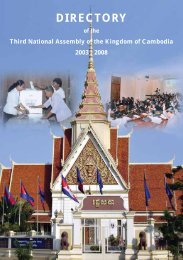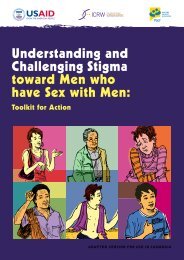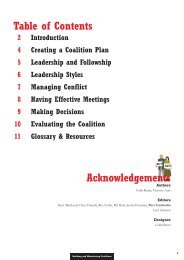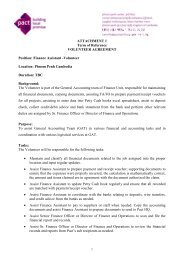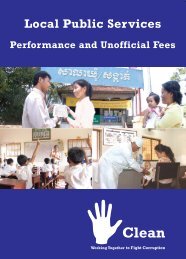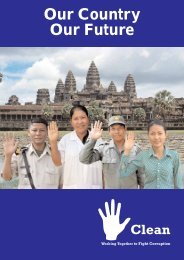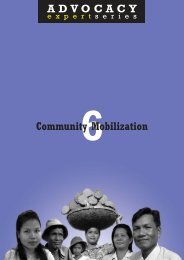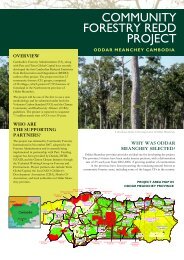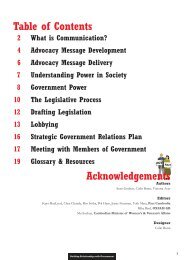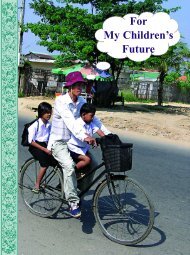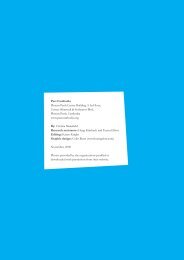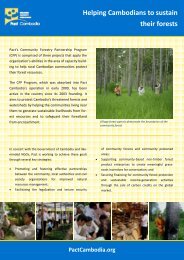Advocacy in Cambodia: Increasing Democratic ... - Pact Cambodia
Advocacy in Cambodia: Increasing Democratic ... - Pact Cambodia
Advocacy in Cambodia: Increasing Democratic ... - Pact Cambodia
You also want an ePaper? Increase the reach of your titles
YUMPU automatically turns print PDFs into web optimized ePapers that Google loves.
each month.<br />
Facilitat<strong>in</strong>g Engagement<br />
While education can be a powerful strategy,<br />
awareness-rais<strong>in</strong>g alone is usually not enough to<br />
accomplish advocacy campaign goals. It is<br />
important for advocates to make issues relevant<br />
to target advocacy audiences. This section<br />
explores other strategies used to engage the public<br />
with government.<br />
Open Forums/Debates<br />
One of the most common engagement<br />
strategies used <strong>in</strong> <strong>Cambodia</strong> today is the public<br />
forum. This mechanism br<strong>in</strong>gs together the<br />
various actors <strong>in</strong>volved <strong>in</strong> an issue along with<br />
members of the public.<br />
Public forums have been<br />
organized around issues<br />
such as the environment,<br />
corruption, land and<br />
fish<strong>in</strong>g disputes, and the<br />
legalization of prostitution.<br />
Forums are often<br />
organized at the prov<strong>in</strong>cial<br />
level, closer to the conflict.<br />
Although not always<br />
tension-free, forums<br />
present an important<br />
mechanism to allow people<br />
to express their views and<br />
hear arguments they<br />
would not normally encounter. Although the<br />
process is not with<strong>in</strong> the usual cultural forms of<br />
communication, benefits of public forums make<br />
them attractive to participat<strong>in</strong>g actors.<br />
The regular COPCEL monthly meet<strong>in</strong>gs<br />
facilitated by CDRI present an example of positive<br />
engagement. The meet<strong>in</strong>gs were <strong>in</strong>itiated to<br />
m<strong>in</strong>imize conflict revolv<strong>in</strong>g around commune<br />
elections by creat<strong>in</strong>g a forum for dialogue between<br />
the ma<strong>in</strong> political parties, government<br />
departments, election officials, and civil society<br />
groups. On average, 35 people attended each<br />
meet<strong>in</strong>g, and meet<strong>in</strong>gs were held over a period of<br />
more than 2 ½ years. While discussions were not<br />
always smooth, the forum was considered highly<br />
successful. Its success is attributed to an absence<br />
of hidden agendas, follow-up one-on-one<br />
meet<strong>in</strong>gs, a non-judgmental context, and<br />
ma<strong>in</strong>ta<strong>in</strong><strong>in</strong>g accurate m<strong>in</strong>utes distributed to<br />
meet<strong>in</strong>g participants. These m<strong>in</strong>utes were adopted<br />
and widely distributed to government agencies<br />
and the four governors and vice-governors of each<br />
prov<strong>in</strong>ce.<br />
A more recent form of engagement was<br />
commune council candidate debates. These<br />
A candidate debate, held <strong>in</strong> January<br />
2002.<br />
debates have great utility because they allow local<br />
leaders to expla<strong>in</strong> why they are the best candidates<br />
while allow<strong>in</strong>g members of the public to ask<br />
questions about past performance and current<br />
agendas. These debates are certa<strong>in</strong>ly a cornerstone<br />
of local democracy. A variation of this strategy is<br />
the election debate organized by the <strong>Cambodia</strong>n<br />
Labor Organization for labor union members.<br />
Although organizers encountered difficulties <strong>in</strong><br />
organiz<strong>in</strong>g the debate and one of the candidates<br />
did not appear, 1,500 union members attended<br />
and the debate was considered a major success.<br />
Consultative Process<br />
A deeper form of engagement is consultation,<br />
a process <strong>in</strong> which community representatives,<br />
NGOs, and other members<br />
from civil society are<br />
<strong>in</strong>vited by the government<br />
to provide <strong>in</strong>put on draft<br />
legislation and policies.<br />
One example is the<br />
<strong>in</strong>clusion of fish<strong>in</strong>g<br />
representatives at a<br />
national workshop to<br />
provide feedback to the<br />
Department of Fisheries on<br />
the draft community<br />
fisheries sub-decree.<br />
This type of<br />
consultation usually occurs<br />
at the <strong>in</strong>sistence of NGOs<br />
or because of stipulations <strong>in</strong> bilateral and<br />
multilateral assistance agreements. For example,<br />
most of the <strong>in</strong>ternational banks require<br />
government consultation with civil society prior<br />
to enactment of legislation. In the same way, the<br />
U.S. Embassy uses its quota system as an <strong>in</strong>centive<br />
to encourage the M<strong>in</strong>istry of Labor to <strong>in</strong>clude labor<br />
union representatives at M<strong>in</strong>istry meet<strong>in</strong>gs.<br />
An equally compell<strong>in</strong>g engagement strategy<br />
is what could be termed ‘reverse consultation,’<br />
when NGOs ask lawmakers to provide <strong>in</strong>put <strong>in</strong>to<br />
a draft law. For example, advocates for the<br />
domestic violence law organized a workshop <strong>in</strong><br />
which they asked parliamentarians to provide<br />
feedback on the draft law, under the assumption<br />
that lawmakers who gave their <strong>in</strong>put <strong>in</strong>to a draft<br />
law would be more likely to support that law when<br />
it was under review at the national assembly.<br />
Exposure Visits<br />
An exposure visit to other countries is<br />
another excellent engagement strategy, although<br />
it is one available more to donors than NGOs, who<br />
do not usually have the f<strong>in</strong>ancial resources for this<br />
type of advocacy. When AFL-CIO reached an<br />
impasse with the M<strong>in</strong>istry of Labor on the new<br />
Increas<strong>in</strong>g <strong>Democratic</strong> Space<br />
27



